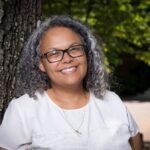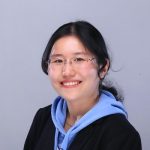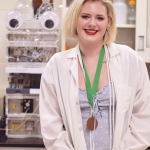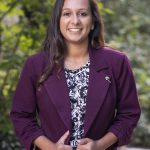The Graduate School responds to the COVID-19 pandemic
An interdisciplinary group of graduate and post-doctoral students have joined together to process and analyze samples that are collected across campus as part of the Carolina COVID-19 Student Service Corps initiative, resulting in a robust response to the COVID-19 pandemic.
Stefani Baca-Atlas, a PhD student in the School of Social Work, responded to a call for volunteers from The Graduate School’s Dean Suzanne Barbour in January 2021.

“There can be a lot of pressure to focus on school, your dissertation, teaching,” Baca-Atlas said. “It doesn’t feel like there can be a lot of time to volunteer, even though something like this feels so urgent. By saying ‘join me,’ she took this great opportunity to say: This is a priority.”
Volunteers and staff have facilitated more than 150,000 COVID-19 tests from the University community since January 2021. Several nights a week, graduate students work after hours in a diagnostic laboratory at the Genome Sciences building to facilitate the testing efforts.
Barbour orchestrates their work alongside colleagues Amir Barzin and Amy James Loftis. Loftis, the laboratory’s associate director, said graduate students’ willingness to respond to COVID-19 is indicative of their desire to get involved.
“These graduate students stepped up when we most needed the help and continue to support the lab to ensure that it runs smoothly,” Loftis said.
Barzin said the students’ helpfulness has led to efficient test processing times for the campus community. Test positivity rates on campus have declined—and have reached an overall low of 0.32 percent as of late March.
“They selflessly have done this to make the lab run smoother during the next day,” Barzin said. “Without their help, we would not be able to produce a turnaround time as fast as what we have right now.”
Barbour, who is also professor of biochemistry and biophysics, recruited graduate students and post-doctoral students, most of whom have wet laboratory experience and/or have worked under biohazard safety level conditions. Each team consists of three to four students, including people who work with specimens and one who serves as a laboratory assistant. Some students are not scientists but are experts in other fields and want to give back.

“I was excited when Amy and Amir approached me about the possibility of involving graduate student in the testing lab,” Barbour said. “But, I was even more excited to see so many students and postdocs respond to the call. Their response is a testament to the generosity of Carolina graduate students and their commitment to our University community.”
Zhitong Yu ’20, a first-year Master of Public Health international student in the Gillings School of Global Public Health, received an undergraduate degree from UNC-Chapel Hill and said processing tests on campus is real-world experience that can be applied following the master’s degree program.

“I think it has made a great impact on campus,” Yu said. “As a member of the Carolina community, I feel like I should do something to help.”
Claire Gates, a first-year PhD student in the Biological & Biomedical Sciences Program, said she has many friends and family who have served as health care providers on the frontlines of the COVID-19 response. For Gates, volunteering in the laboratory is a small way to do her part. In the laboratory, she prepares COVID-19 test swabs to be tested for the virus—the lab can facilitate more than 7,000 tests per day.

“I think that what this really says about graduate students and the nature of the work is when the rest of the world might say, ‘I don’t want to do this,’ […] We do what we need to do to get the job done,” Gates said.
Graduate students volunteer alongside students from varied disciplines
Gates, who worked in emergency medicine before pursuing her PhD, said the lab facilitates an environment where a community can be built and where other volunteers can see the benefits of interdisciplinary work.
“This is something I can do, and it’s something I can feel good about,” Gates said. “Perspective from other people is one of the best things I can get for my own work.”
Baca-Atlas said that volunteering has given her real-world experience she needed as she continues her research on structural violence, health inequities, and traumatic events. While she spends her time in the lab cleaning bins and sanitizing beakers, Baca-Atlas said she feels like a valued part of the team—similar to how she hopes to model her own research teams during her academic career.
Baca-Atlas has noticed Loftis’s and Barzin’s quiet leadership among graduate students; for example, she said they recently sent flowers to volunteers to say thank you. “Kindness makes you want to go back.”
Making connections
Baca-Atlas likened the volunteer experience in the lab to The Graduate School’s Diversity and Student Success (DSS) Carolina Grad Students F1RST program, which celebrates first-generation graduate and professional students. She credited a DSS degree advancement award with contributing to her success.
“The [Carolina F1RST program] has absolutely been a game changer for me,” Baca-Atlas said. She also noted Barbour’s leadership in assembling the volunteer teams and in facilitating a sense of community among graduate and professional students.
“Dean Barbour normalized the ability for us to take the time to volunteer,” Baca-Atlas said. “It was so nice to feel so immediately a part of something. Everybody wants to feel like they’re doing their part to curb the virus spread.”
Denali Dahl, a PhD candidate in the Joint Department of Biomedical Engineering between UNC-CH and North Carolina State University, has processed COVID-19 nasal swab samples during her time in the lab. She came to the University following her time at Duke University, where she received a master’s degree in global health.

“I’m always looking to give back,” Dahl said. “If I’m able to help out, I want to help keep our campus safe […] “No matter what your skill set is, you have some way to give back and to help out with the challenges you see around you.” Dahl, who is pursuing research in health equity specific to women’s health, said Carolina is an excellent choice to pursue graduate and professional education opportunities because it fosters innovation, including developing technologies to combat global health challenges. For Dahl, the call for her to respond to the global health challenge of COVID-19 began with Barbour.
“She knew this was an issue and figured out a way to incorporate graduate students,” Dahl said. “We’re here and can make the time, but we needed her to put the pieces together. The fact that she made this a priority says a lot.”
The Graduate School, founded in 1903, supports more than 160 degree-offering programs in a variety of disciplines. Barbour, PhD, is also a professor in the UNC School of Medicine Department of Biochemistry and Biophysics. Barzin, DO, MS, is an assistant professor in the UNC School of Medicine Department of Family Medicine. Loftis is affiliated with the UNC Institute for Global Health and Infectious Diseases. Baca-Atlas, MSW, is a two-time alumna of Arizona State University. Dahl is an alumna of the University of California San Diego. Gates is a 2019 alumna of UNC-Charlotte. Yu holds bachelor’s degrees in biology and in statistics. If you are a graduate or post-doctoral student and want to volunteer with the lab, contact The Graduate School.
